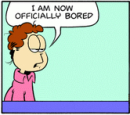
If you have not yet checked out the online sensation
, you have been missing out. Launched in February of 2008, this comic is a unique version of Jim Davis’ “Garfield” which provides an entirely different vantage point on Jon Arbuckle’s life simply by removing the lasagna-loving cat from all the frames. Without Garfield, the comic is no longer a silly strip for children but instead reveals “the existential angst..of Mr. Jon Arbuckle…as he fights a losing battle against loneliness and depression in a quiet American suburb,” says the creator, Dan Walsh.
What About Copyright Issues?
With today’s obsession with our “culture of ownership,” where everything from the music we listen to the photos used in blog posts to the blog comments themselves are “owned” by someone and have varying rights of use associated with them, you would imagine that such a creation as “Garfield Minus Garfield” would have been shut down by the copyright cops long before it had a chance to create an online following.

However, that was not the case and the reason is because Jim Davis, who pens the original strip, was actually intrigued and pleased with the concept. He even went so far as to thank Walsh, saying: “I want to thank Dan for enabling me to see another side of Garfield. Some of the strips he chose were slappers: ‘Oh, I could have left that out.’ It would have been funnier.”
Now, the online strip will make the move to the printed page. Thanks to Davis’ involvement and admiration for the Walsh’s version of the comic, Ballantine Books will soon be publishing a book inspired by “Garfield Minus Garfield.” In the book, readers will see both the original strip and the one in which Garfield has been removed. Walsh will contribute the forward to the book.

Allowing Art To Flourish
Something about this news brought to mind a recent Wired article on an entirely unrelated subject – the Personal Genome Project. There was a quote from George Church of Harvard Medical School, which was about openness as it related to technology: “sharing technologies by distributing them as widely as possible with minimal restrictions on use encourages both the adoption and the impact of a technology.”

Arguably, sharing with no restriction on use has implications far beyond just technology – it can impact art as well. Whether or not you want to classify “Garfield Minus Garfield” as “art” is up to you, but by not clamping down on the copyright, Davis allowed a whole new creation to come into existence…and one I read with enthusiasm every day.
Will Davis’ respect and willing embrace of the modified strip have any greater ramifications in our society as to change our perceptions about what it means to own a thought, idea, or creation? Will it affect our opinions on when that ownership should or should not be restricted? Sadly, probably not. The belief that because you created or thought of something gives you control over it is instilled so deep into our communal thinking, especially here in the U.S., it will take more than a new comic to retrain our thoughts on the subject. It only speaks to what could be.

The Garfield Minus Garfield book will be published simultaneously with the Garfield 30th anniversary book in October of this year.

















